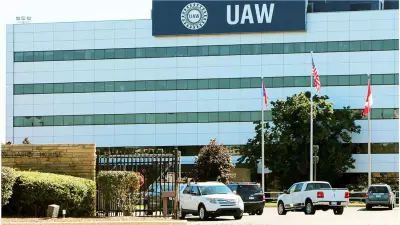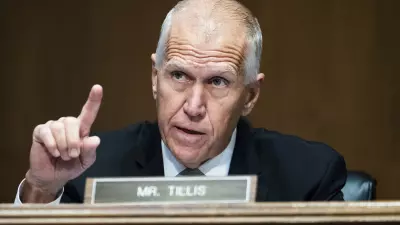The United Auto Workers contract negotiations did not yield an agreement by the deadline, sending about 150,000 members into what union leaders are calling a “stand up strike” of rotating targets.

Within moments, the union initiated walkouts at three major U.S. factories.
For the first time, the UAW is striking each of the Big Three automakers — General Motors, Ford Motor Co. and Stellantis, which now owns the former Fiat-Chrysler.
The three factories — including one in Michigan — were told to be ready to strike two hours earlier when UAW President Shawn Fain said negotiations with the Big Three were still in progress.
“This is our defining moment,” Fain said during a Facebook live event that attracted over 100,000 viewers.
Workers at the three initial strike locations then started to mobilize, wearing red shirts and carrying signs.
Among them were employees of Ford’s Michigan Assembly factory in Wayne,, where 3,300 workers build popular Broncos and Rangers. Video from the scene showed workers gathered near entry gates just before midnight, waving signs that read “Michigan is a Union Town,” “United for a Strong Contract” and “End All Tiers.”
The other two initial strike targets are Toledo Assembly, where Stellantis builds Jeeps, and General Motors Wentzville Assembly, a truck factory near St. Louis, Missouri.
Reaction from Stellantis was immediate.
“We are extremely disappointed by the UAW leadership’s refusal to engage in a responsible manner to reach a fair agreement in the best interest of our employees, their families and our customers,” according to a statement issued at 12:01 a.m. “We immediately put the company in contingency mode and will take all the appropriate structural decisions to protect our North American operations and the company.”
Michigan business leaders also weighed in, saying that the strike’s impact goes beyond the automotive industry.
“It disproportionately impacts Michigan residents, especially those in the middle class,” said Sandy Baruah, president and CEO of the Detroit Regional Chamber. “Every (Big Three) auto job impacts between seven to 10 other jobs, which are all at risk as the strike shuts down the industry.
“As Michigan has the highest concentration of auto-related jobs, our state will take the lion’s share of the negative economic impact.”
Bridge Michigan is a nonprofit, nonpartisan news organization that provides passionate and rooted Michigan readers with honest, fact-driven journalism on the state’s diverse people, politics, and economy. We serve as your watchdog on the biggest issues impacting your daily life, giving you insightful coverage you can’t get anywhere else. Receive Bridge in your inbox for free by subscribing here.







